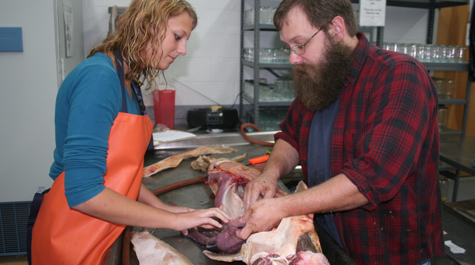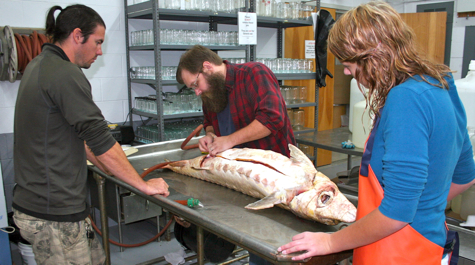Gloucester High senior dives into marine science
Gloucester High senior Samantha Prince has always loved marine biology. A mentorship at the Virginia Institute of Marine Science is now providing her with the opportunity to put that passion into practice.
Prince is participating in the mentorship at VIMS as part of her Senior Boards at Gloucester High. Required of all 12th graders, the Boards allow students to partner with teachers, family, and the professional community to gain hands-on experience in an area of interest. The students select a topic, conduct research, and apply the research in a written report or physical product to their advisors.
Prince began her activities at VIMS with the dissection of a 4-foot Atlantic sturgeon under the guidance of professor Eric Hilton, a world-renowned expert on these ancient fishes. Hilton studies sturgeon anatomy and classification as part of a worldwide effort to restore sturgeon populations, which have been devastated by overharvesting of caviar, destruction of nesting habitat, and construction of dams.
“The sturgeon dissection with Dr. Hilton was definitely a good experience,” says Prince. “I’ve never seen the inside of a fish before besides on my plate at the dinner table, so I learned a lot from dissecting its different parts.”
The dissected sturgeon was captured last spring in a gillnet in the James River, where fisheries scientists from VIMS and Virginia Commonwealth University are working with commercial anglers and the Army Corps of Engineers to reduce by-catch and restore the sturgeon population.
In the coming months, Prince will shadow practicing scientists and provide hands-on support on a number of other research projects. She’ll work with fisheries scientist Leonard Machut to monitor the migration of American eels into Wareham Pond on the James River; and with professor Emmett Duffy and marine technician Paul Richardson to test the most efficient ways of turning algae into fuel.
Prince will also work with Sarah McGuire, education coordinator with the Chesapeake Bay National Estuarine Research Reserve program at VIMS, to bring Bay science into local 7th grade classrooms through the Bay Watershed Education and Training (BWET) program, and to bring marine science to the public through CBNERR’s monthly Discovery Labs.
Prince says she chose VIMS for her Senior Boards because “I've always been interested in marine science. I’ve taken field trips to VIMS before and really enjoyed it so I thought it would be fun to volunteer there now that I'm older.”
Prince has nurtured her academic interest in marine science by taking “as many science classes as possible,” with Biology and Oceanography being her favorites.
She credits her oceanography teacher, Mrs. Anne Markwith, with encouraging her interest in marine science. “She is my staff evaluator for my senior boards project and is the one who referred me to VIMS,” says Prince.
She also credits her family. “Ever since I was a little girl, I was always out on the water. On the beach or on a boat are my favorite places to be. My dad is also interested in the water, he always takes me out on our boat to go fishing.”
Prince’s efforts in the classroom and at VIMS will help her achieve her career goal, which is to bring her love of marine science to the classroom. After graduation, she plans to attend Rappahannock Community College and then transfer to Christopher Newport University. “I would really enjoy becoming a teacher so I can teach kids about the subject of marine biology,” she says.
Mentorships at VIMS depend on the interest and availability of a faculty mentor. For details, visit www.vims.edu/education/internships




